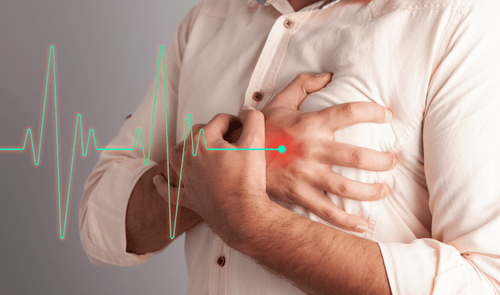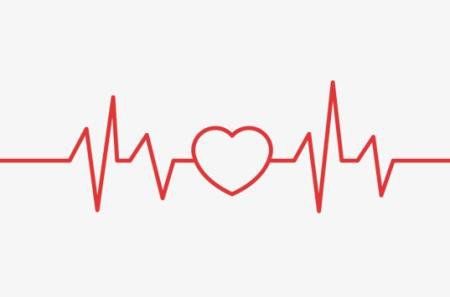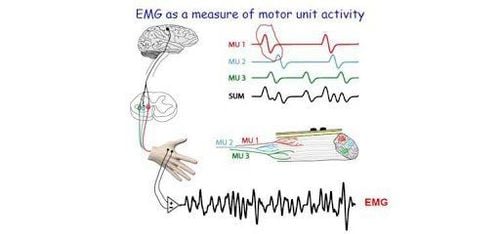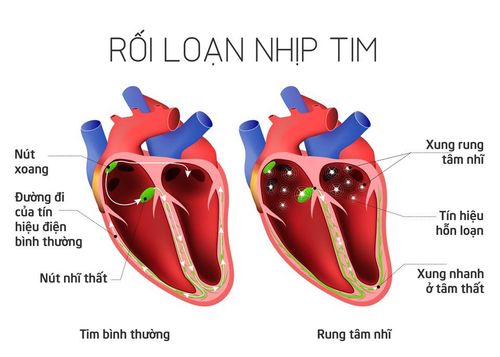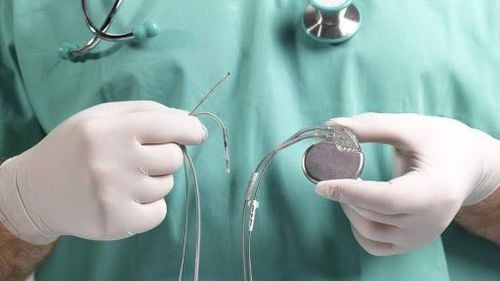This is an automatically translated article.
The article was written by Cardiologist - Department of Examination & Internal Medicine - Vinmec Phu Quoc International General HospitalElectrophysiology Studies (EPS) is a laboratory test that examines the electrical activity of the heart to find out where in the heart the cause of the arrhythmia is coming from. From the results, the doctor will prescribe whether to use antiarrhythmic drugs, a pacemaker, implantable cardioverter-defibrillator (ICD: Implantable Cardioverter Defibrillator), electrophysiological ablation or surgery. Cardiac electrophysiology testing will take place in a special room called the EPS room, or interventional cardiology room.
1. Who needs an electrophysiology test?
When someone's heart doesn't beat normally, doctors use EPS to find the cause and prescribe treatment. Electrical signals usually pass through the heart in a regular direction. Heart attack, aging, and high blood pressure can all cause scarring of the heart. This can cause the heart to beat irregularly (out of sync). The abnormal electrical pathways found in some congenital heart defects can also cause arrhythmias.During EPS, doctors insert a thin tube called a catheter into a blood vessel leading to your heart. A dedicated electrode catheter designed for EPS allows electrical signals to be sent to the heart and its electrical activity recorded, thereby accurately assessing the location of damage. In some cases, the doctor will have to stimulate the cardiac nervous system to cause arrhythmias, thereby assessing the entire function and extent of damage of the cardiac nervous system. When the lesion is clearly identified, if there is an indication for radiofrequency treatment, the doctor will switch to this technique.
Doctors use EPS to see:
Locate arrhythmic lesions. Evaluation of the effectiveness of drugs in the treatment of cardiac arrhythmias. If the cause is caused by the arrhythmia, it will be treated to destroy the arrhythmia with radio frequency waves through the electrode catheter. Helps determine which pacemaker or implantable defibrillator (ICD) will be used for the patient. If you are at risk for heart problems such as fainting or sudden death from cardiac arrest. During EPS, about 3 to 5 electrode catheters are placed inside the heart to record the heart's electrical activity.
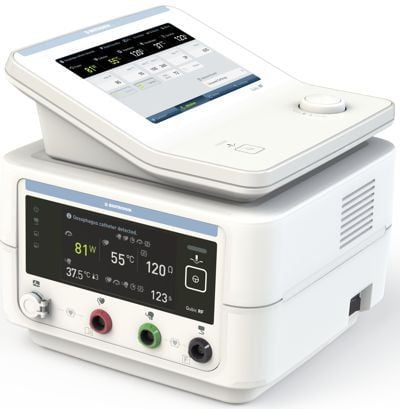
Máy thăm dò điện sinh lý tim
2. What is the risk of EPS?
Risks of doing EPS may include:Arrhythmia: During EPS, you may have an irregular heartbeat that makes you dizzy. If this happens, your doctor may give your heart an electric shock to help it beat back to normal. Blood clots: can sometimes form at the tip of the catheter, circulating and blocking a blood vessel. Your doctor may give you medicine to prevent blood clots. Infection, bleeding, and bruising at the site where the catheter went (inguinal, arm, or neck). Your doctor or nurse will help you avoid these problems.
3. What do you need to prepare before EPS?
Do not eat or drink anything for 6 to 8 hours before the test. Tell your doctor about any medications you are taking, including over-the-counter medicines, herbs, and vitamins. Do not stop taking your medication without your doctor telling you to. You should accompany your loved one when you come to the hospital for examination and discharge. If you normally wear hearing aids, wear glasses during the procedure.
4. What happens during EPS?
In a hospital or clinic, doctors and nurses do EPS in a room with special equipment for testing. You may have heard that this room is called the electrophysiology room. Some people call it the cath lab. There are two main machine systems:Digital angiography system: helps doctors observe the probe electrodes in the heart chambers. Electrophysiological system: process the parameters received from the heart chamber and perform treatment techniques. During the EPS test:
A nurse will place an intravenous line into your arm. You will be given an injection (a sedative) to help you relax. But you are awake and able to follow instructions during the test. The nurse will clean and shave the part of your body where the doctor will open the way into the blood vessels. This is usually in the groin but can be the arm or neck. You will be given an injection - a local anesthetic - to numb the area. Your doctor will insert a needle through your skin and into your blood vessels. The electrode catheters are inserted all the way to the heart chambers. Through the screen of the angiogram, the doctor determines the position of the electrodes in the heart chambers corresponding to the locations to be probed. Your doctor will send small electrical pulses through the catheter to make your heart beat at different speeds. You may feel your heart beat harder or faster. The electrical signals generated by your heart will be analyzed by the electrophysiology system to analyze the changes, thereby accurately assessing the location of the damage. The doctor will remove the catheters and intravenous lines. Your nurse will press firmly on the puncture to stop the bleeding. EPS usually lasts 1 to 4 hours. If the type and location of the arrhythmia is determined and destructive ablation of the pacemaker or the insertion of a pacemaker or ICD is needed, the procedure can be performed during or immediately after the EPS.
5. How are you cared for after EPS?
You will be moved to a recovery room, where you should rest quietly for 1 to 3 hours. During this time:Lie still in bed, keeping arms or legs straight. The nurse will check you regularly to see if there is bleeding or swelling at the puncture site. After the sedative wears off, your doctor will talk to you about the test results. Before you leave, you will be given instructions on what to do and monitored at home.
6. What do you need to do at home?
Follow the instructions given by your nurse or doctor, including taking any new medications prescribed. Most people can start eating food and taking medicine within 4 to 6 hours of the test. Patients can go about their normal daily activities the next day. Do not drive within 24 hours.The puncture site may be sore for several days. Small bruising at the puncture site is normal. If the spot begins to bleed, lie flat and press firmly on the spot. Have someone call the doctor.
7. What do you need to monitor?
Call 911 if you notice:Sudden increase in swelling around the puncture site. The bleeding does not slow down when you press hard on the procedure site. Call your doctor right away if you notice:
Your arm or leg used for the procedure is numb or tingling. Your hands or feet feel very cold or change color. The procedure site looks increasingly bruised, swollen, or fluid starts to drain from it.
8. How to know your EPS results?
Usually, your doctor will ask you to make an appointment to discuss the results. You will also discuss your treatment at that appointment.9. How can you learn more about EPS?
Talk to your doctor. Here are some questions you can ask your doctor:Is there any medicine that I can take to control my irregular heartbeat without having an implant procedure or electrophysiology ? Will I need a pacemaker or implantable defibrillator (ICD) now or in the future? What Causes My Irregular Heartbeat? Am I at risk for serious heart rhythm problems in the future? Vinmec International General Hospital is one of the hospitals that not only ensures professional quality with a team of leading medical doctors, modern equipment and technology system. The hospital provides comprehensive, professional medical examination, consultation and treatment services, civilized, polite, safe and maximum sterilization space. Customers when choosing to perform tests here can be completely assured of the accuracy of test results.
In April & May 2021, when there is a need for medical examination and treatment at Vinmec Times City International General Hospital, customers will enjoy dual incentives:
- Free specialist examination and discount 50% of many cardiac checkup packages such as:
+ Basic Cardiovascular Screening Package
+ Hypertension Checkup Package
+ Heart Failure Checkup Package
+ Coronary Cardiovascular Examination Package
+ Comprehensive Cardiovascular Checkup Package
- 50 off % of cost for customers with post-examination treatment indications. The program is limited to the corresponding technique of each hospital and to customers who perform this treatment technique for the first time at Vinmec.
Please dial HOTLINE for more information or register for an appointment HERE. Download MyVinmec app to make appointments faster and to manage your bookings easily.




